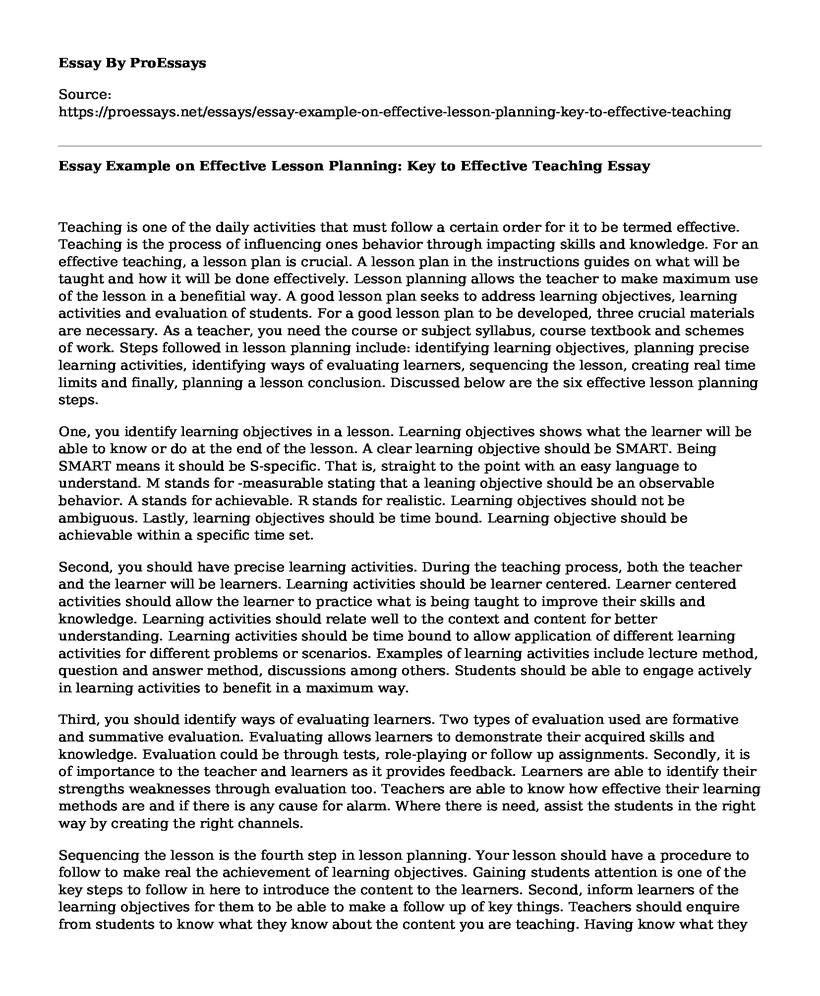Teaching is one of the daily activities that must follow a certain order for it to be termed effective. Teaching is the process of influencing ones behavior through impacting skills and knowledge. For an effective teaching, a lesson plan is crucial. A lesson plan in the instructions guides on what will be taught and how it will be done effectively. Lesson planning allows the teacher to make maximum use of the lesson in a benefitial way. A good lesson plan seeks to address learning objectives, learning activities and evaluation of students. For a good lesson plan to be developed, three crucial materials are necessary. As a teacher, you need the course or subject syllabus, course textbook and schemes of work. Steps followed in lesson planning include: identifying learning objectives, planning precise learning activities, identifying ways of evaluating learners, sequencing the lesson, creating real time limits and finally, planning a lesson conclusion. Discussed below are the six effective lesson planning steps.
One, you identify learning objectives in a lesson. Learning objectives shows what the learner will be able to know or do at the end of the lesson. A clear learning objective should be SMART. Being SMART means it should be S-specific. That is, straight to the point with an easy language to understand. M stands for -measurable stating that a leaning objective should be an observable behavior. A stands for achievable. R stands for realistic. Learning objectives should not be ambiguous. Lastly, learning objectives should be time bound. Learning objective should be achievable within a specific time set.
Second, you should have precise learning activities. During the teaching process, both the teacher and the learner will be learners. Learning activities should be learner centered. Learner centered activities should allow the learner to practice what is being taught to improve their skills and knowledge. Learning activities should relate well to the context and content for better understanding. Learning activities should be time bound to allow application of different learning activities for different problems or scenarios. Examples of learning activities include lecture method, question and answer method, discussions among others. Students should be able to engage actively in learning activities to benefit in a maximum way.
Third, you should identify ways of evaluating learners. Two types of evaluation used are formative and summative evaluation. Evaluating allows learners to demonstrate their acquired skills and knowledge. Evaluation could be through tests, role-playing or follow up assignments. Secondly, it is of importance to the teacher and learners as it provides feedback. Learners are able to identify their strengths weaknesses through evaluation too. Teachers are able to know how effective their learning methods are and if there is any cause for alarm. Where there is need, assist the students in the right way by creating the right channels.
Sequencing the lesson is the fourth step in lesson planning. Your lesson should have a procedure to follow to make real the achievement of learning objectives. Gaining students attention is one of the key steps to follow in here to introduce the content to the learners. Second, inform learners of the learning objectives for them to be able to make a follow up of key things. Teachers should enquire from students to know what they know about the content you are teaching. Having know what they have, present the new content. The rule of the game remains teaching from known to unknown. Learners should be guided on how to get more information about the content through relating to prior knowledge.
Realistic timeline is essential in lesson planning. Assuming you have a forty minutes lesson with twenty learning objectives! This is close to impossible having in mind you must make a positive impact to the learners. Make the list of your objectives narrow and limit every objective to certain minutes. You should have some minutes at the end of the lesson to answer critical questions that will enhance understanding. Teachers should be flexible enough to adjust to the needs of the students rather than having a fixed program yielding no positive results. However, you need to be more careful to ensure you do not get out of topic and fail to achieve the set goals and objectives.
Lastly, having a lesson conclusion is essential for a teacher. Concluding a lesson marks the climax of the taught content. Lesson conclusion provides an opportunity to emphasize the important points in the lesson, make any clarification, checking students understanding and introduce the next topic or subtopic. Lesson conclusion can be done in three ways. One, the teacher gives a summary of the main points. Secondly, asking a student to give a summary of important points they have learnt. Lastly, ask students to write a summary of the important points in their notebooks.
Conclusion
In conclusion, lesson planning is a key step to take before the actual class presentations. Lesson planning allows you to have humble time having well prepared the lesson. All the necessary resources for supporting the lesson identified and finding them will make teaching in class an easy task. Six crucial steps followed in lesson planning are identifying learning objectives, planning precise learning, identifying ways of evaluation, sequencing the lesson, creating real time limits and planning lesson conclusion.
Cite this page
Essay Example on Effective Lesson Planning: Key to Effective Teaching. (2023, Feb 20). Retrieved from https://proessays.net/essays/essay-example-on-effective-lesson-planning-key-to-effective-teaching
If you are the original author of this essay and no longer wish to have it published on the ProEssays website, please click below to request its removal:
- Program and Statement of the Evaluation Goals of East Brunswick School
- The Economic Plight of the Afghans in Australia Reflection Essay Example
- Essay Sample on Parent-Teacher Partnership: Building the Parent School
- Create SMART Goals & Milestones for Success: Essay Sample
- Essay Example on Critical Thinking: Building Resistance in the Classroom
- Paper Example on Thinking Critically: Self-Improvement for Scholarly Clarity and Logic
- Three Friends and a Fight: Friendship Put to the Test - Essay Sample







